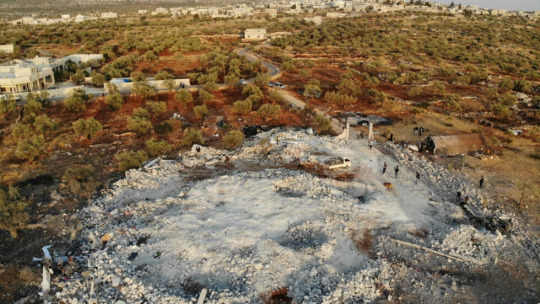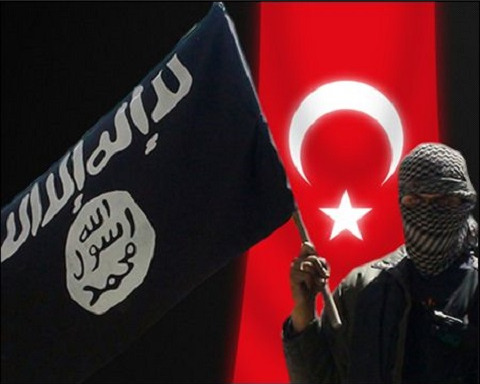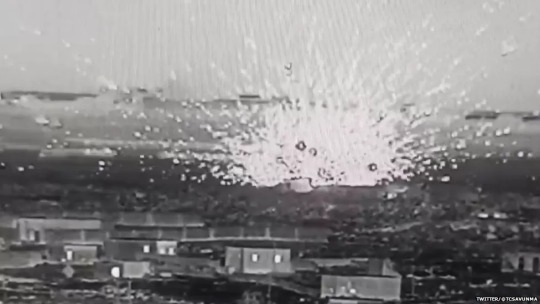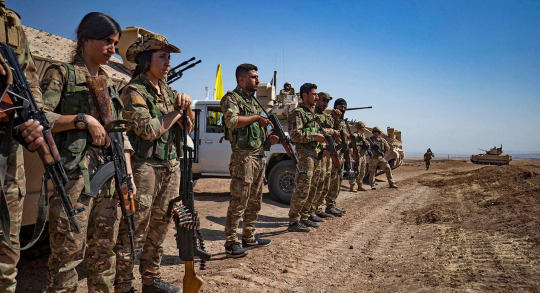#abu bakr al-baghdadi
Explore tagged Tumblr posts
Text

Title/Name: Ibrahim Awad Ibrahim Ali al-Badri, commonly known as 'Abu Bakr al-Baghdadi', (1971-2019). Bio: Iraqi militant, caliph of the Islamic State. Country: Iraq Wojak Series: Feels Guy (Variant) Image by: Unknown Main Tag: Abu Bakr al-Baghdadi Wojak
#Ibrahim Awad Ibrahim Ali al-Badri#Abu Bakr al-Baghdadi#Iraqi militant#Islamic State#Iraq#Feels Guy#Variant#Wojak#Politics#Islam#Muslim#Religion#Feels Guy Wojak#Abu Bakr al-Baghdadi Wojak#Feels Guy Series#Gray#Black
3 notes
·
View notes
Text
RUSSIA’S SUPREME COURT OUTLAWS LGBTQ
Russian security forces raided gay clubs and bars across Moscow Friday night, less than 48 hours after the country’s top court banned what it called the “global LGBTQ+ movement” as an extremist organization. (Photo by Anton Vaganov/REUTERS) TALLINN, Estonia (AP) — Russia’s Supreme Court effectively outlawed LGBTQ+ activism on Thursday, the most drastic step against advocates of gay, lesbian and…

View On WordPress
#196 Immigration Act#Abu Bakr al-Baghdadi#Al-Qaeda#Ansar Allah Movement#Beat#Benjamin "Bibi" Netanyahu#Benny Gantz#Bibi#Boris Johnson#Covid hearings#Covid Inquiry#Dasha Litvinova#Dubai climate talks#eating disorders#Estonia#Gaza#Gaza Strip#Hamas#Hassan Nasrallah#Hizbullah#Houthis#ISIS#Jerusalem District Court#Joe Biden#Justice Ministry#Kay Burley#Kingdom of God#lesbian#LGBTQ#Ma&039;ariv
3 notes
·
View notes
Text
Now, the Mount Vernon Ladies' Association does occasionally sell items made from fallen historical trees, and there was in fact a white oak that George planted that fell. The real question is: is the knife actually made from that wood?
Wait no the silliest part of this story is:

What's the problem with that story?

al-Baghdadi didn't die from being shot.
Abu Bakr al-Baghdadi killed himself, and two children, with a suicide vest.
Trump should know that tidbit, because he announced it to the world:

The backdrop can't be made from the shirt of the dude who shot al-Baghdadi in the face because al-Baghdadi wasn't shot in the face. And now I doubt the provenance of the steel and the wood.
So, yeah, "forging" mystical artifacts for Trump.

they are now forging mystical artifacts for trump
1K notes
·
View notes
Text

1 note
·
View note
Text





Abu Bakr al-Baghdadi (2014-2019)
Abu Ibrahim al-Hashimi al-Qurashi (2019-2022)
Abu al-Hasan al-Hashimi al-Qurashi (Feb'22-Oct'22)
Abu al-Hussein al-Husseini al-Qurashi (2022-2023)
Abu Hafs al-Hashimi al-Qurashi (since 2023)
#Abu Bakr al-Baghdadi#Abu Ibrahim al-Hashimi al-Qurashi#Abu al-Hasan al-Hashimi al-Qurashi#Abu al-Hussein al-Husseini al-Qurashi#Abu Hafs al-Hashimi al-Qurashi#IS#ISIS#ISIL#Daesh
0 notes
Note
Whats the diff bewteen daesh & Al-qaeda?
Al-Qaeda sprung out as a rebel group against the pro-soviet communist government of Afghanistan with the leadership of Bin Ladin. Al-Qaeda is far more concerned about the interest of Muslims in SWANA and seek to overthrow the Muslim governments which they consider corrupt. Bin Ladin was more concerned about building up an islamist vanguard against the Western powers and its "Jewish" elite, and favoured large-scale, dramatic attacks against strategic or symbolic targets, such as the twin towers. While Al-Qaeda adopts some sectarian policies, they do not carry out attacks against Muslims of different branches.
DAESH is a global jihadist group concerned with the establishment of a global caliphate. It began initially as al-Qaeda of Iraq (not affiliated with Al-Qaeda despite its name) following the illegal invasion of Iraq. Composed of Iraqi Baathists, tribal Sunni leaders, etnical groups and Salafists. Al-Zarkawi was the leader of Al-Qaeda in Iraq and would encourage his followers to carry out attacks against any group that did not swear allegience to their cause. As a precursor group to ISIS, they were far more sectarian and sought to establish an Islamic emirate in Iraq and its environs, often with the sole purpose of eliminating the local Shi'as, non-Muslims and Sunni "apostates". When Zarqawi was killed following a US lead operation, Abu Bakr al-BAghdadi, a former Guantanamo inmate, would shore up support due to the brutal policies of the Iraqi PM Nour al-Maliki, which affected Iraq's Sunni minority, ultimately leading to the formation of ISIS. The Islamic State embraces some of al-Qaeda's goals, but see expansionism as an effective tool to recruit new fighters and while also carrying out indiscriminate bombings against its enemies. As opposed to al-Qaeda, ISIS is also known for its atrocity propaganda, which it sees as an effective tool for mass recruitment.
In short: Al-Qaeda is concerned with the enemies from far away (the west). ISIS is concerned with the enemies nearby (literally everyone.).
89 notes
·
View notes
Text
Journalist Aaron Maté: No country is a monolith. Syrians are celebrating the fall of a repressive, authoritarian government. Other Syrians, particularly from minority groups, are now living in fear of/fleeing from the sectarian insurgents taking its place.
The "rebel" leader, Abu Mohammad al-Jolani, is the founding leader of Al Qaeda in Syria, al-Nusra, and a former deputy to ISIS leader Abu Bakr al-Baghdadi.
Jolani now claims that this was just a "phase", but he's never apologized for the atrocities committed under his watch. This includes August 2013 massacres in Alawite areas of Latakia, which saw "the systematic killing of entire families," an Human Rights Watch investigation (https://www.hrw.org/sites/default/files/reports/syria1013_ForUpload.pdf) found. As one veteran NYT correspondent reported, the insurgents were devoted to "sectarian mass murder."
The same global compassion for Syrians who suffered under Assad should also extend to those Syrians now fearing new atrocities. That's especially the case for those of us whose governments have contributed to Syria's suffering.
The US and allies spent billions of dollars arming an insurgency that they knew (https://www.aaronmate.net/p/al-qaeda-is-on-our-side-how-obama) was dominated by Al Qaeda -- and that carried out atrocities like in Latakia. The US military has occupied a large swath of northeastern Syria, stealing its oil and wheat. The US has also imposed crippling sanctions that, as Trump-Biden officials boast about, "crushed" Syria's economy, "deny reconstruction", and have "exacerbated fuel and food shortages for everyday Syrians."
From arming insurgents, occupying (https://www.aaronmate.net/p/to-keep-troops-in-syria-us-leaders) oil/wheat fields, to imposing (https://www.aaronmate.net/p/as-arab-states-seek-peace-us-insists) sanctions that hurt everyday Syrians, the aim of this regime change campaign was to cause enough misery in Syria so that its government imploded and its place in the axis of resistance was severed. After years of war, pillage, and economic strangulation that has finally happened. While one authoritarian system has collapsed, another one has succeeded.
13 notes
·
View notes
Text
by Giulio Meotti
There were shameful scenes at a Women's Rights Day demonstration in Munich's Marienplatz. Palestinian flags everywhere. Israeli flags were not welcome. Left-wing and pro-Palestinian groups insulted and pushed several Jewish women. Among the participants was the president of the Jewish community of Munich, Charlotte Knobloch (a Holocaust survivor).
Same scenes in Paris. Insults, attempted aggression, threats, and throwing of projectiles, the pro-Israeli collectives had to be exfiltrated from the Paris demonstration organized on the occasion of International Women's Rights Day. "We heard slogans like 'dirty Jews,' 'Nazis,' 'Israeli murderers,'" Mélanie Pauli-Geysse, president of No Silence, told Le Point.
No media or feminist organization in Europe is following the testimonies reported by the survivors of the family of Abu Bakr al Baghdadi, the caliph of Daesh.
Eggs, broken bottles, rubber bullets. "It was then that the situation worsened, we were only able to walk a few minutes before being exfiltrated by the police for our safety."
In L'Express, Sarah Barukh wrote: "There were Iranian, Afghan, Israeli, Pakistani, Yazidi, and others. We denounce the devastation of apartheid imposed by radical Islamism. We stand alongside women who are victims of barbaric traditions such as excision, in France and elsewhere." Next to her, Mona Jafarian, who fled from Iran, and Father Desbois, a Catholic priest who returned from Ukraine and recounted his life with Yazidi women, his arrest in Iraq, and his death sentence in several countries designated as lands of Islam because "I expressed words of sympathy towards the Jews."
Meanwhile, the Algerian writer Kamel Daoud writes that no media or feminist organization in Europe is following the testimonies reported by the survivors of the family of Abu Bakr al Baghdadi, the caliph of Daesh. His daughter, his wives, his sexual slaves are interviewed on Saudi TV to talk about the caliph.
"No relaunch in newspapers or platforms, no analysis, no echo," writes Daoud. "Western neo-feminism, crumbling into particularisms, is indifferent to this 'Muslim' scene where the condition of millions of women parades, beyond digital screens and the effects of ideological bubbles."
A forced tour should then be immediately organized to the Hamas cages under Gaza where Hamas is holding Israeli female hostages. And for those who don't feel like it, there is still the exhibition in London in which the conditions of imprisonment of the Israelis were recreated based on the testimonies of those who were exchanged in November.
Nothing seems to interfere with the ideological excitement these old and perverse peacocks derive from a barbarism they mistake for rebellion.
There is a pathological reluctance across the West to believe that Hamas has raped and mutilated women. "It didn't happen" or "where is the proof?" The speed with which these people went from saying "believe women" and #MeToo to "show the rape photos or it didn't happen" is mind-blowing.
Rape denial is so widespread that some have felt compelled to take to the streets to raise awareness of Hamas's sexual crimes. British Jews and their (few) allies gathered near BBC headquarters to say "rape is not resistance." Some wore jogging bottoms with stains between the legs, in solidarity with Naama Levy, the 19-year-old Israeli woman seen in that very state shortly after the Hamas pogrom.
The West went from "believe women" to "believe terrorists."
Nothing seems to interfere with the ideological excitement these old and perverse peacocks derive from a barbarism they mistake for rebellion in an unholy marriage of Western self-loathing and Islamic Jihad. They are willing to do anything to save the most squalid moral vanity and be able to continue selling us their "goodness." Except that it is really evil.
47 notes
·
View notes
Text
The breakthrough hostages-for-a-cease-fire deal between Hamas and Israel was struck Wednesday because the terror group understood that the terms of any agreement under President-elect Donald Trump would be far worse, according to his incoming White House national security adviser.
“Clearly, the entire world recognizes that this was the Trump effect,” Rep. Mike Waltz (R-Fla.), who will serve as Trump’s principal adviser on all national security issues, told Fox News “Special Report” host Bret Baier.
Waltz argued that Hamas “had no choice” but to accept the deal, which will lay the path to freeing 33 hostages over the next 42 days in exchange for Israel releasing 1,000 Palestinians imprisoned in jails and pushing troops out of some parts of northern Gaza.
“They believed President Trump when he said there would be all hell to pay and any deal that was on the table would only get worse once he was in office,” the incoming White House national security adviser said of the terror group responsible for the Oct. 7, 2023, attack on the Jewish State.
“I mean, this is President Trump – who took out [Iranian Gen. Qasem] Soleimani, who took out [Islamic State boss Abu Bakr] al-Baghdadi – I think all these terrorist organizations understand now, the type of man and the type of leader that they’re dealing with,” Waltz said.
Waltz noted that he understands the concerns about the Palestinians being released as part of the deal but “at the end of the day, those hostages have been down there in those tunnels getting raped, abused, in horrific conditions.”
“They had been there longer than the 1979 hostages, and in much more horrific conditions,” he added, referring to the 53 Americans who were held hostage by Iran near the end of Jimmy Carter’s presidency.
Even Biden insiders admit it took Trump to close the cease-fire and Israel hostage deal
“I’m convinced they all would have died if President Trump hadn’t come in and said, ‘Get them out,’” Waltz said of the Hamas-held hostages, who have been in captivity for the last 15 months.
Waltz called the landmark agreement “a Reagan moment” for Trump, because Hamas “understood the consequences if they didn’t get this done.”
The Iranian hostages were released on Jan. 20, 1981, the day former President Ronald Reagan replaced Carter in the White House.
Waltz indicated that Trump, 78, will have no reservations about supporting Israel if it ends up needing to “go back in” to Gaza and conduct more operations against Hamas.
“We’ve made it very clear to the Israelis, and I want the people of Israel to hear me on this – If they need to go back in, we’re with them,” the Florida Republican said.
“If Hamas doesn’t live up to the terms of this agreement, we are with them,” he added.
Israel-Hamas cease-fire deal is back on after ‘last-minute crisis’ resolved: official
On the future of the terror group, Waltz was adamant that Hamas is “not going to continue as a military entity” and will have no role in governing Gaza should peace last in the region.
“I think by the end of President Trump’s term, we’re going to be talking about rail and fiber and data centers and moving the region forward. In a way that only President Trump could transform,” he added, referring to what the broader Middle Eastern region will look like under Trump.
5 notes
·
View notes
Text
US In ‘Direct Contact’ With Designated Terror Group HTS, Blinken Admits
by Tyler Durden | Dec 15, 2024
The US has made “direct contact” with the group Hayat Tahrir al-Sham (HTS) under Abu Mohammad al-Jolani which now holds Damascus and most major Syrian cities in the wake of Assad’s fall.
“We’ve been in contact with HTS and with other parties,” US Secretary of State Antony Blinken said following talks with Arab diplomats in Aqaba, Jordan.
This is the first official acknowledgement that the Biden administration is interacting with HTS, which has long been an officially US-designated terror organization, as it originated as Syrian al-Qaeda. Jolani also was once the personal envoy of ISIS terror leader Abu Bakr al-Baghdadi.
NBC News has underscored, “The U.S. designates HTS a terrorist organization, making it legally impossible to work with the group, but contact underscores ongoing efforts to change that designation as the U.S. and its allies look to support Syria’s transition from Assad rule.”
A statement from Blinken’s meetings in Aqaba and signed by representatives of the US, EU, Turkey and several Arab countries called for a “a more hopeful, secure and peaceful future”. It urged the protection of women and all ethnic and religious minorities, and for the preventing of “the reemergence of all terrorist groups.”
Also, Jordan’s foreign minister stressed that regional powers don’t want to see post-Assad Syria “descend into chaos”. Given that it remains formally listed as a terror group, HTS was not represented in the Jordan meeting.
5 notes
·
View notes
Text
The U.S. president has significant latitude to use military force even in the absence of congressional authorization and even when such action would violate international law. Through its military interventions in the Middle East since Oct. 7, 2023, the Biden administration has both further eroded the existing guardrails constraining presidential war powers and possibly bequeathed a new conflict with the Houthis to his successor.
Despite President-elect Donald Trump’s oft-deployed slogan of “no new wars” and claims that United States was at peace during his first administration, Washington both engaged in new conflicts and expanded and intensified existing ones without fresh congressional authorization under this leadership between 2017 and 2021.
Trump’s first four years in the White House revealed a commander in chief who, while erratic, had certain tendencies with respect to the use of military force. Due in part to his transactional nature, Trump was generally skeptical of large-scale U.S. military presence overseas and the value of U.S. alliances and partnerships. He was prone to one-upmanship with respect to U.S. military action—launching attacks in part because prior presidents had refrained from them.
Given the wide freedom of action afforded the commander in chief and the might of the U.S. military, decisions by the incoming president on the use of force could be globally consequential. In light of those stakes, it is worth revisiting Trump’s track record on the use of military force during his first term in office.
When Trump took office in 2017, he inherited a narrowly focused U.S. military mission in the complicated battle space of the Syrian civil war. Despite broader policy objectives, his immediate predecessor, President Barack Obama, had limited direct military force in Syria to fight the Islamic State, rejecting calls from his advisors to attack Bashar al-Assad and enforce the administration’s self-imposed “red line” on chemical weapon use.
Despite a monthslong review of the Obama administration’s campaign plan to fight the Islamic State, the Trump administration’s most notable initial shift was redubbing “ISIL” to “ISIS.” Although the destruction of the Islamic State’s physical “caliphate” and the killing of its leader Abu Bakr al-Baghdadi ultimately occurred on Trump’s watch in 2019, mostly his administration continued Obama’s counterterrorism playbook.
However, Trump had cause to revisit Obama’s red line early in the administration when Assad’s forces launched a deadly sarin attack on Khan Shaykhun in 2017, killing dozens of civilians, including children. According to two of Trump’s children, Trump decided to strike in retaliation after seeing images of Syrian children fatally poisoned. Trump’s statements also suggested that he wished to one-up Obama, critiquing his predecessor for failing to enforce the red line.
Yet, Trump’s original retaliation plan wasn’t implemented. According to reporter Bob Woodward and later partially confirmed by Trump, Trump called Defense Secretary Jim Mattis seemingly to demand the assassination of Assad, shouting, “Let’s fucking kill him! Let’s go in. Let’s kill the fucking lot of them.”
Woodward reports that Mattis told his subordinates, “We’re not going to do any of that. We’re going to be much more measured.” (Trump has denied this account of events.) And so, the U.S. retaliation was more measured, consisting of airstrikes on the Shayrat airbase, which was allegedly used to conduct the fatal sarin attack.
Although Trump was enthusiastic about killing terrorists, he had an aversion to anything he perceived as nation-building and was deeply skeptical of large-scale troop deployments. These sentiments contributed to his precipitous decision in December 2018 while on a phone call with Turkish President Recep Tayyip Erdogan—to withdraw all U.S. forces from Syria. The sudden move led to the Mattis’s resignation.
Despite Trump’s announcement, U.S. forces remained in Syria as officials in his administration walked back the decision of total withdrawal. This was partly due to Trump’s intermittent focus on the matter and the separate, more ambitious Syria agendas of his underlings, some of whom were more interested in using U.S. troops to counter Iran rather than the Islamic State. Later, in October 2019, Trump did in fact partially pull back US troops in northern Syria at the urging of Turkey.
Trump was also convinced by officials within his administration and members of Congress to retain some U.S. forces in Syria to “keep the oil.” These advocates appealed to Trump’s long-stated desire for concrete material benefit from U.S. military deployments. The reality that “keeping the oil” was both impractical and illegal did not matter.
Trump’s policy shift on Iran was more dramatic. Obama left office having constrained Iran’s nuclear program through a painstakingly crafted multilateral agreement while Tehran’s paramilitary proxies in Iraq observed a wary truce with U.S. forces as they both fought the Islamic State.
After firing many of the supposed adults in the room in his administration, Trump pulled out of the Iran nuclear deal and reimposed sanctions to apply “maximum pressure.” These actions upended a tense modus vivendi in Iraq. With Tehran no longer restraining them, Iran-backed paramilitary groups based in Iraq resumed attacks on U.S. forces in 2018.
Even so, Trump was not eager to engage in a major conflict with Iran. After the Iranian downing of a U.S. drone over the Persian Gulf in 2019, Trump ultimately refrained from the retaliatory attack advocated by his hawkish advisors—reportedly due to cautionary counsel from Tucker Carlson. Trump also refrained from attacking Iran in response to Iranian missile strikes on oil facilities in Saudi Arabia. Despite publicly blaming Tehran for the September 2019 attack, Trump announced he would “like to avoid” conflict with Iran and indicated interest in a new nuclear deal with the Islamic Republic.
Yet, the Iran hawks surrounding Trump ultimately convinced him to take significant and provocative military action against Iran. According to reporting by Jack Murphy and Zach Dorfman, officials such as then-CIA Director Mike Pompeo began planning to kill Iranian Gen. Qassem Suleimani as early as 2017. Continuing attacks on U.S. personnel in Iraq from Iran-backed forces in late 2019 provided justification; he was ultimately killed in January 2020.
What exactly Trump’s advisors told him about the likely Iranian response to Suleimani’s killing is unclear. But he does not seem to have expected the retaliatory ballistic missile barrage that Iran unleashed on U.S. troops in Iraq. Certainly, he sought to immediately downplay the attack in an effort to de-escalate with Iran—tweeting out “all is well” following the strikes. Trump has continued to minimize the injuries to U.S. troops—more than 100 service members with traumatic brain injuries—as headaches. Indeed, Pentagon officials were reportedly concerned that awarding Purple Hearts to wounded troops would undermine Trump’s narrative.
Such predictable Iranian retaliation was the reason that both the Bush and Obama administrations had refrained from killing Suleimani.
The Trump administration, Iran hawks in Congress, and the commentariat have subsequently tried to cast Suleimani’s killing as “restoring deterrence” vis-a-vis Iran. Such spin obscures not only Iran’s immediate ballistic missile attack on U.S. troops, but also further attacks on U.S. forces in Iraq by Iran-backed groups during the remainder of Trump’s term, some of which resulted in U.S. fatalities.
In Yemen, the Obama administration gave Trump a counterterrorism campaign against al Qaeda in the Arabian Peninsula (AQAP) and a conflict with Houthi militants in which the United States was not directly fighting (apart from a single strike on Houthi radar facility in late 2016).
Still, the United States was providing essential arms, maintenance, and spare parts for the ruinous bombing campaign waged by a Saudi Arabia-led military coalition. The coalition’s penchant for using U.S. weapons to bomb Yemeni civilians—and its failure to improve targeting over 18 months—led the outgoing president to suspend precision-guided munition transfers to Saudi Arabia after its warplanes bombed a funeral in Sanaa, killing more than 100 civilians.
Among Trump’s very first military actions as commander in chief was greenlighting a rare and risky commando raid against AQAP in Yemen that the outgoing Obama administration had forgone. The U.S. assault alongside forces from the United Arab Emirates resulted in numerous civilian casualties—including children—and the death of a U.S. Navy SEAL.
Trump also promptly reversed Obama’s lame-duck arms sales suspension. While he had little interest in direct U.S. military engagement in the Saudi-Houthi conflict, Trump was all too eager to sell weapons to Riyadh.
Although his administration would later seek assurances from Saudi Arabia that it would use U.S. weapons consistent with the law of war, the desire to sell weapons overshadowed accountability. After Saudi Arabia used U.S.-supplied precision-guided munitions to attack a school bus full of Yemeni children in 2018, Trump characterized the strike as a “horror show” and candidly admitted that the Saudis “didn’t know how to use the weapon.”
When the State Department’s inspector general investigated U.S. arms sales to Saudi Arabia and the Department’s efforts to limit civilian casualties, Trump fired the inspector general and the Department later suppressed the investigation’s full results.
There is no crystal ball to predict how Trump will wield his power as commander-in-chief. The degree of Trump’s personal involvement in policy, who he chooses to listen to, and the willingness or ability of his team to temper outlandish proposals are among the many sources of uncertainty.
Nonetheless, his record from 2017 to 2021 and subsequent statements—particularly following the 2024 election—could offer a preview of his agenda as commander in chief.
Trump is no dove, and he is fond of issuing blustery military threats. (His recent comments regarding potential military action with respect to Greenland and Panama appear to be mostly trolling and bluster—for now.) And though such threats alone may harm U.S. interests, he has often lacked follow through, and it seems he would avoid intentionally involving the United States in a major armed conflict. Indeed, he may again seek to remove U.S. forces from conflicts in Syria, Somalia, and potentially Iraq.
Yet, Trump’s instincts should provide only limited comfort to those concerned about further U.S. wars. His willingness to escalate U.S. bombing campaigns in Somalia and Afghanistan before moving to withdraw U.S. forces could provide a template for how he will handle the conflict with the Houthis he may inherit. His track record with enabling Saudi Arabia’s military campaign in Yemen suggests that he is happy to fuel other countries’ wars, no matter how they are waged.
And, as with the Suleimani strike, Trump may act heedlessly without fully appreciating the consequences of his actions—particularly if encouraged by his advisors. In this respect, Trump’s musings during his first term about missile strikes on Mexican drug cartels are particularly worrying.
By casting doubts on whether the United States would come to the defense of allies and partners, Trump may encourage adventurism by revisionist rivals as well as nuclear hedging by countries such as South Korea, which may decide that it is time for a level of self-reliance they have not previously considered necessary.
Trump’s boosters sometimes laud his unpredictability as a virtue that keeps foreign adversaries off balance and deterred. Whether it is a virtue or not, the commander in chief of the world’s most powerful military will again be unpredictable and likely even less constrained than he was during his first term given the weak guardrails on use of force by the U.S. president.
6 notes
·
View notes
Text
3 notes
·
View notes
Photo

Military Dog Injured During Abu Bakr al-Baghdadi Raid Will Be Okay, Administration Official Says via Submitted October 28, 2019 at 04:48PM by heyitsrider, Poop4U
#meme#dogmeme#funny#doglover#doggrooming#cute dog#dogs#my doggo#puppy doggo#best doggo#doggoargentino#cute doggo#sleepy doggo#standing doggy#doggysitting#doggy#cute doggy#doggram#doggo art#doggosbeingdoggos#doggolife#doggone#doggolove#doggoals#doggomemes#cute animals#animals#animal#happy pets#petcare
39 notes
·
View notes
Text

Kakistocracy #CorpMedia #Idiocracy #Oligarchs #MegaBanks vs #Union #Occupy #NoDAPL #BLM #SDF #DACA #MeToo #Humanity #DemExit #FeelTheBern
JinJiyanAzadi #BijiRojava SDF balance sheet of battle in northern Syria for the 11th day [UPDATES]
The Turkish military offensive seeking to invade North and East Syria was launched on October 9 and continues despite the ceasefire between the U.S. and Turkey announced on Thursday…

RELATED UPDATE: US secrecy on Baghdadi raid exposes distrust of NATO ally Turkey

RELATED UPDATE: Treasury Report Highlights Turkey as Islamic State’s Logistical Hub

RELATED UPDATE: America's allies in Syria accuse Turkey of giving ISIS a "safe zone"

RELATED UPDATE: IntelBrief: Turkey has Long Been an Important Support Base for Islamic State

RELATED UPDATE: Questions and Answers: Turkey’s Threatened Incursion into Northern Syria

RELATED UPDATE: Turkey will launch Syria ground operation after strikes - Erdogan

RELATED UPDATE: U.S. calls for de-escalation as Turkey threatens ground assault into Syria
https://www.washingtonpost.com/world/2022/11/23/turkey-kurds-syria-attack/

RELATED UPDATE: Mazloum Abdi: Turkish Attacks Impact Fight Against ISIS
https://carnegieendowment.org/sada/88619
FURTHER READING:
#Kakistocracy#CorpMedia#Idiocracy#Oligarchs#MegaBanks vs#Union#Occupy#NoDAPL#BLM#SDF#DACA#MeToo#Humanity#DemExit#FeelTheBern#JinJiyanAzadi#BijiRojava
10 notes
·
View notes
Text
'They wanted to break me, but they lost.’ Iraqis recount IS horrors in Mosul

When the Islamic State group rampaged through Iraq’s ancient city of Mosul a decade ago, the jihadists killed thousands, upended countless more lives and left deep scars among the survivors. Under their self-declared “caliphate” stretching across swathes of Syria and Iraq, they committed beheadings, torture and enslavement, turning life into living hell and leaving behind mass graves.
The Sunni Muslim extremists seized Mosul on June 10, 2014 and the group’s then leader, Abu Bakr al-Baghdadi, soon made his first public appearance in the city’s iconic Great Mosque of Al-Nuri. In the lands they controlled, the jihadists banned music, burnt books and punished perceived wrongdoers by stoning them and cutting off the fingers of smokers and the hands of alleged thieves.
It was not until 2017 that US-backed Iraqi forces drove IS out of Mosul in one of the bloodiest urban battles of modern times, leaving behind a city in rubble and despair. When the guns fell silent, Mosul’s traumatized residents were left to rebuild their shattered lives. AFP spoke to three of them about their memories of that terrible time.

Azad Hassan, 29, was a young student when IS came, and he suffered the full brunt of their violence. He lost one of his hands to the jihadists, and relatives whom he never saw again. He recalled the terrifying spring morning in 2015 when a crowd gathered in a Mosul square, with all eyes fixed on him, his brother and two other men.
His heart thumped in his chest when he saw the people cheering, their excitement strangely reminding him of a football match. “It was as if Real Madrid and Barcelona were playing,” the 29-year-old recalled, before adding that the situation was deadly serious. IS fighters “cut off our hands”, Hassan said, explaining that they were being punished for a feud with a jihadist.
The family’s suffering did not end there. IS detained Hassan’s brother and three other relatives, and they remain missing to this day. Hassan said he did not give in to a thirst for revenge, but kept studying, started a family and would soon receive his Master’s diploma in Arabic literature.
Now the father of a seven-year-old, he said he has also become an advocate for people with disabilities and for missing persons. Although he admits to often having to battle negative feelings, he said that his “willpower always prevails”. “They wanted to break me, but they lost,” he said. “I now go to university, play football and drive. But the scar is still here.”

Two days before the jihadists swept into Mosul, Judge Ahmed Hureithi left the city to find refuge in Baghdad, but then the extremists came for his family. They detained his father and two brothers, and later beheaded the youngest “with a sword”. He was only 17 years old. “They published pictures,” said Hureithi, 60. “They were proud of such acts.”
Years later, Hureithi would preside over a court in the capital Baghdad, judging hundreds of former fighters for unleashing their reign of terror. In 2019, he sentenced to death 11 French nationals, although they are still being held in an Iraqi prison. “I ruled according to Iraqi law,” Hureithi said. “The evidence was sufficient and clear.”
The courts have handed down hundreds of death and life sentences to people convicted of “terrorism” in trials that some human rights groups have denounced as hasty. Hureithi is adamant that he bears no grudge against the defendants and that he “acted with great impartiality”.
Hureithi returned to a still-devastated Mosul in 2020, and is now vice president of Nineveh province’s court of appeal. “I didn’t recognize the city,” the judge recalled. “It was as if I was entering it for the first time.”

When IS invaded the city, music shop owner Amar Kheder had one goal: to get his beloved music collection out of harm’s way before the jihadists destroyed it. He arranged for a food truck driver to take his decades-old collection of vinyl, tapes, radios and gramophones to friends in Baghdad.
“We concealed the boxes behind the food,” Kheder, 50, recalled. “Once the archive was out of harm’s way, I was relieved.” Jihadists turned up once to enquire about the music shop, but by then he had already turned it into a secondhand clothing store.
He decided to stay in Mosul in the belief that IS rule would last just a few months. In the end, it was three years before the jihadists were ejected.
Undeterred by the destruction in the city, Kheder restored his shop and sent to Baghdad for the treasures that his family had collected over more than 50 years. His is not just any store, but a balm for the soul, he said. “I consider it a pharmacy … it offers each person a remedy.”
Today, Kheder’s shop is again filled with a trove of music history. Vinyl discs, cassette tapes and CDs occupy every corner — many Iraqi and Arab artists, but also Bach and Beethoven.
Vintage round tables, classic radios and old recording machines take center stage, and the walls are adorned with framed pictures of iconic Arab singers from a bygone era. After so much suffering, Kheder said, his music treasure in Mosul has survived and “life has come back … to a city for historians, intellectuals and scholars”.
#manchester#iraq#iraqi#london#baghdad#mosul#france#scotland#liverpool#usa#europe#human rights#world history#history#culture#classical music#world news#general election#labour party#keir starmer#rishi sunak#general election 2024
2 notes
·
View notes
Text

Gen. David Petraeus ***** O Mínimo São Quinze (15) Dias.

Jesus ✞ Cristo NIM 16385098 ****
Só Não Vai a Muralha da China, porque os Estados Unidos dão Emprego!!
A Guerra [É] apenas um projeto. O Meu Mínimo São Nove (9) Anos.
➡ (C)ontrolar Baghdad
➡ Destruir a [F]acilidade de Abu Bakr al-Baghdadi (Passagem por Jerusalém) e bin Laden Volta
➡ Destruir Todo o Iraque (F-16 Fighting Falcon)
➡ Destruir a [F]acilidade Nuclear do Irão
➡ Fim da III Guerra Mundial 7 de Maio de 2045
4 notes
·
View notes